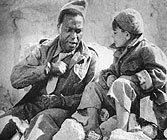|
|
|
|
Paisà
|
 |
|
Anyone coming innocently to Paisà without foreknowledge of its canonical status as "a masterpiece of neo-realism as well as one of the peaks of film history" (José Luis Guarner) could be forgiven for giving up within its first five minutes. It begins as a mediocre war film: stock footage of the American campaign in Italy, Hollywood-style music, bad actors barking military commands. It is only by the end of the first of six, self-contained episodes that Roberto Rossellini's off-hand style has begun to weave its stark magic – after a bullet abruptly terminates the life of a soldier telling his life story, and shortly afterwards we see the corpse of his companion, a woman killed by the Germans and dismissed, unknowingly, by the surviving Americans as a "dirty Iti". Rossellini's chronicle of the years 1943-6 is marked by devastation, brutality, incomprehension and misrecognition at all levels. An American does not realise that the prostitute who has taken him home is the woman he fell sweetly for six months earlier; a streetwise lad befriends a drunken, black soldier and steals his shoes the instant he falls asleep; and the film's final image – one of the bleakest in all cinema – is the merciless execution of a line of partisans. Rossellini develops a structure and a form to match his sometimes bittersweet, often grim succession of events: startling plot ellipses, cross-purpose dialogues in multiple languages, and a rigorously unsentimental, matter-of-fact presentation of human horrors. Paisà's genius is in locating the telling, scattered traces of personal life within the nightmare of war's history. MORE Rossellini: Voyage in Italy © Adrian Martin April 2003 |
![]()